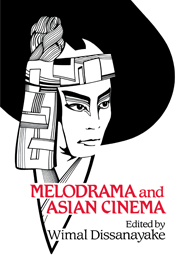Book contents
- Frontmatter
- Contents
- List of contributors
- Acknowledgments
- I Introduction
- II Melodrama / subjectivity / ideology: Western melodrama theories and their relevance to recent Chinese cinema
- III Symbolic representation and symbolic violence: Chinese family melodrama of the early 1980s
- IV The Goddess: Reflections on melodrama East and West
- V Melodrama as historical understanding: The making and unmaking of communist history
- VI Melodrama, postmodernism, and Japanese cinema
- VII Inscribing the subject: The melodramatization of gender in An Actor's Revenge
- VIII Insides and outsides: Cross-cultural criticism and Japanese film melodrama
- IX Psyches, ideologies, and melodrama: The United States and Japan
- X Negotiating the transition to capitalism: The case of Andaz
- XI The concepts of evil and social order in Indian melodrama: An evolving dialectic
- XII Politics of melodrama in Indonesian cinema
- XIII Power, pleasure, and desire: The female body in Filipino melodrama
- XIV The register of nightmare: Melodrama as it (dis)appears in Australian film
- XV Overview: What is American about film study in America?
- Index
III - Symbolic representation and symbolic violence: Chinese family melodrama of the early 1980s
Published online by Cambridge University Press: 05 June 2012
- Frontmatter
- Contents
- List of contributors
- Acknowledgments
- I Introduction
- II Melodrama / subjectivity / ideology: Western melodrama theories and their relevance to recent Chinese cinema
- III Symbolic representation and symbolic violence: Chinese family melodrama of the early 1980s
- IV The Goddess: Reflections on melodrama East and West
- V Melodrama as historical understanding: The making and unmaking of communist history
- VI Melodrama, postmodernism, and Japanese cinema
- VII Inscribing the subject: The melodramatization of gender in An Actor's Revenge
- VIII Insides and outsides: Cross-cultural criticism and Japanese film melodrama
- IX Psyches, ideologies, and melodrama: The United States and Japan
- X Negotiating the transition to capitalism: The case of Andaz
- XI The concepts of evil and social order in Indian melodrama: An evolving dialectic
- XII Politics of melodrama in Indonesian cinema
- XIII Power, pleasure, and desire: The female body in Filipino melodrama
- XIV The register of nightmare: Melodrama as it (dis)appears in Australian film
- XV Overview: What is American about film study in America?
- Index
Summary
Family melodrama has been one of the dominant forms of expression in Chinese cinema since its beginning in the early years of this century. The centrality of the genre in Chinese cinema derives to some extent from the position of the family in Chinese society. The family, rather than the individual or the state, was the most significant social unit in traditional China. In addition to its basic socioeconomic functions, the family constituted a unique social-security system that provided care for its needy and aging members and a religious unit where ancestor worship was performed (Eastman 1988). The Chinese family as a social institution was characterized by a hierarchical power structure, but it also represented a cultural ideal consisting of a set of norms that motivated the individual in his or her social practices.
Although the family pattern in traditional China varied, the extended family system, which was typical of the land-owning gentry class, was the culturally dominant type (Lang 1946). The hierarchical power relations within this patriarchal family system were sanctioned by Confucianism, the dominant ideology of both the state and the family. Of the five moral codes Confucianism prescribed to govern human relationships – ruler–subject, father–son, husband–wife, elder brother–younger brother, friend–friend – three concerned the family. Since the late nineteenth century, as Western capitalism has forced its way into China, this dominant social institution has been increasingly challenged by the emergence of the nuclear family as a new sociocultural norm.
- Type
- Chapter
- Information
- Melodrama and Asian Cinema , pp. 29 - 58Publisher: Cambridge University PressPrint publication year: 1993
- 3
- Cited by

